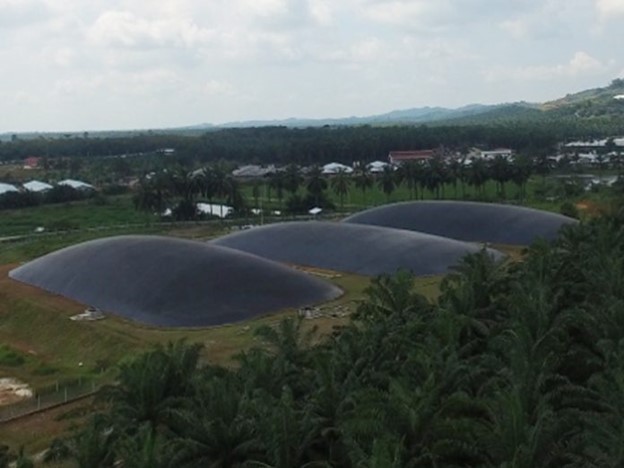Asian pork producers have caught up with the trend of health-conscious and sustainable consumption. According to this trend, consumers are increasingly concerned about the production process and its environmental impact.
According to a report on the Asian food industry by Rabobank, Temasek, PWC, and Terrascope, Asia accounts for 42% of the total agricultural emissions globally, with Southeast Asia and South Asia contributing 50% and 45%, respectively.
Meanwhile, the FAO also emphasizes that greenhouse gas emissions from agricultural production increased by 10% from 2000 to 2021. Although emissions from pig farming are lower than those from ruminant livestock, they are still significant.
The encouraging news is that there are many solutions within the pork production value chain that can meet the demands for sustainability and environmental friendliness, which producers can consider and implement.

Renewable energy production using biogas technology helps increase sustainability and improve farm efficiency.
Carbon emissions from fertilizers
The carbon dioxide (CO2) emissions from pig farming and pig manure account for about 8% of total emissions.
According to Vietnam's Ministry of Agriculture and Rural Development, if agricultural waste is not better managed, the livestock industry, in which pig farming is the largest segment, will continue to emit about 15 million tons of CO2 into the environment.
Deputy Minister of Agriculture Phung Duc Tien said that Vietnam produces about 61 million tons of manure and 304 million cubic meters of wastewater from livestock activities. Addressing the issue of manure management will contribute to increasing sustainability and improving farm efficiency. This will also contribute to fulfilling climate change commitments, replacing clean energy sources, and contributing to the net zero emissions target by 2050.
From traditional farming to zero emissions

David Whitehead
Mr. David John Whitehead, Chairman of Mavin Group's Board of Directors, shared with Asian Agribiz magazine reporters, “Traditional intensive pig farming practices cause high levels of environmental pollution.”
“The Vietnamese agricultural industry has shifted its focus from revenue and profit to implementing environmentally friendly farming practices. We must reduce greenhouse gas emissions to contribute to the government's overall net-zero emissions goal by 2050.”
To achieve this, companies are focusing on addressing issues such as managing feed and water inputs, recycling output waste, and reducing energy usage, while also considering the impact of livestock production on society and paying attention to animal welfare.
In Vietnam, Mavin is one of the pioneers in biogas technology derived from animal waste, solar energy use in pig farms, and increasing recycling rates throughout its entire supply chain. Mavin's Chairman stated that the group is also working to reduce the number of feed deliveries and animal transportation to reduce emissions.
Mavin's farms and feed mills also research solutions to optimize production processes to reduce electricity usage, increase recycling, and decrease emissions.
Moving towards sustainable production

Vicent Henry Go
Universal Robina Corporation (URC), one of the largest livestock companies in the Philippines, has made sustainability a central focus of its programs.
URC prioritizes the use of renewable energy and converting animal waste into biogas. "This helps reduce carbon emissions and also contributes to cost savings," said Vincent Henry Go, URC's executive director.
"These savings amount to millions of pesos each year, and although energy is a modest part of our costs, these savings are still valued."
Another way URC is moving towards sustainability is through optimizing its nutritional strategies. Since pig production requires significant amounts of feed, any progress towards minimizing consumption will contribute significantly to sustainability. Mr. Go stated that the company has been researching and implementing new nutritional technologies to maximize raw material utilization.
Value chain approach
In Thailand, CP Foods is a leading company in sustainable pig production, with various programs aimed at reducing carbon emissions.
CP also requires its suppliers to pay attention to sustainability aspects and advises them on solutions to minimize carbon emissions.
"We are committed to supporting and developing business partners and farmers in the supply chain to improve production capabilities and manage the environment responsibly, in compliance with international standards", said Thidarat Dechayonbuncha, CP Foods' Head of Purchasing.
Measuring CO2 emissions

Marco de Mik
Sustainable production is not only about reducing emissions from livestock feed. “The carbon footprint of feed is just part of the story when it comes to ecological sustainability in the animal production chain,” said Marco de Mik, an advisor at Schothorst Feed Research Institute.
“We also need to consider other aspects such as biodiversity, freshwater usage, land use, and more. Furthermore, ecological sustainability not only depends on feed ingredients but also on farm and slaughterhouse management.”
To achieve this goal, BASF has developed Opteinics software, which can help identify the ecological footprint of feed production from the feed plant to the slaughterhouse. Marco de Mik said he is using it to analyze data and calculate greenhouse gas emissions for each ton of pig carcass weight. He is interested in the question: Is the carbon footprint lower if pigs are raised to a higher slaughter weight (130 kg versus 100 kg)?
What he found is that while raising pigs to a higher slaughter weight means higher feed consumption and lower feed efficiency, fewer pigs are needed to produce one ton of carcass. “Therefore, the carbon footprint per 1,000 kg of carcass, when considering the feed-to-slaughter chain, is lower at higher slaughter weights.”
Mr. de Mik offered a new perspective on 'feed efficiency.' Instead of just considering the kg of meat produced per kg of feed, producers should also consider the “nutrition and environmental picture.”
The journey towards sustainability has begun...
The journey towards sustainability is not easy and is not solely the responsibility of producers. They must work with the government and other related industries to achieve sustainability goals. Positive signs of this collaboration have emerged, though slower than expected, but they will lead to progress.
Source: Asian Agribiz magazine, Author: Isa Q Tan